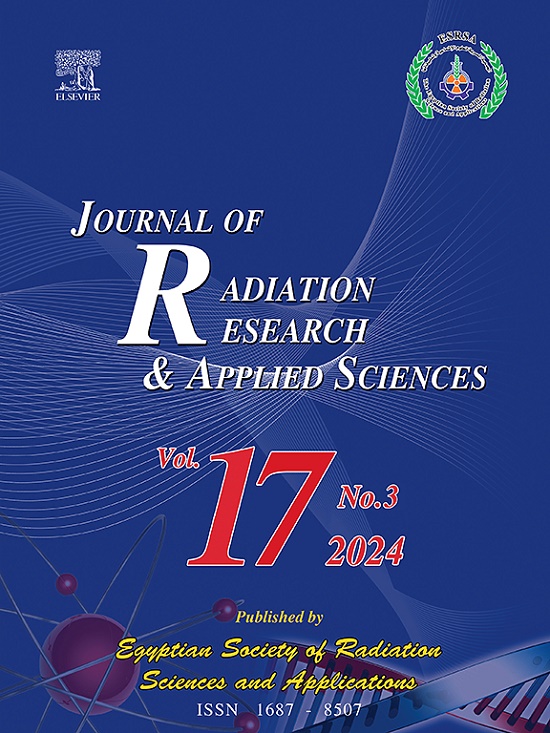Comparing the efficacy of linovera spray plus hydrocortisone cream for breast cancer patients undergoing conformal radiotherapy
IF 1.7
4区 综合性期刊
Q2 MULTIDISCIPLINARY SCIENCES
Journal of Radiation Research and Applied Sciences
Pub Date : 2024-10-14
DOI:10.1016/j.jrras.2024.101137
引用次数: 0
Abstract
Background
Breast cancer is one of the most prevalent malignancies globally, with a significant proportion of patients undergoing radiotherapy, a crucial treatment modality that substantially reduces recurrence rates. However, radiotherapy is often complicated by dermatological adverse effects ranging from mild erythema to severe dermal burns. Despite various interventions aimed at mitigating skin toxicities, the efficacy of hyperoxygenated fatty acids (HOFA) in this context remains underexplored.
Objective
To evaluate the effectiveness of topical HOFA (Linovera spray) in preventing radiotherapy-induced skin reactions in breast cancer patients undergoing conformal radiotherapy.
Methods
This prospective, randomized, controlled trial enrolled post-partial mastectomy breast cancer patients indicated for conformal radiotherapy targeting lymph node levels and the supraclavicular region, with dosages of 45–50 Gy and a 60 Gy tumor bed boost. Patients with active skin diseases or sensitivity to the study spray were excluded. The intervention group applied hydrocortisone ointment and Linovera spray twice daily to the treatment site, while the control group used only hydrocortisone ointment. Skin reactions were graded using the validated Global Skin Reaction Classification and assessed during radiotherapy weeks 3 and 5.
Results
All 60 randomized patients (intervention n = 24, control n = 28) developed radiation dermatitis. By week 5, the intervention group showed a statistically significant reduction in dermatitis severity versus controls (p = 0.04). Dermatitis grades also significantly worsened within both groups from week 3–5 (all p < 0.001).
Conclusion
While HOFA-based moisturizers did not statistically impact overall incidence or severity, marginal benefits were observed with prolonged Linovera spray plus hydrocortisone use versus hydrocortisone alone by week 5. Further research is warranted to explore HOFA's potential skin-protective effects.
比较 linovera 喷雾剂和氢化可的松乳膏对接受适形放射治疗的乳腺癌患者的疗效
背景乳腺癌是全球发病率最高的恶性肿瘤之一,相当一部分患者接受放射治疗,这是一种重要的治疗方式,可大大降低复发率。然而,放疗往往会因皮肤不良反应而变得复杂,从轻度红斑到严重的皮肤灼伤,不一而足。目的 评估局部使用 HOFA(Linovera 喷雾剂)预防接受适形放疗的乳腺癌患者放疗引起的皮肤反应的效果。方法这项前瞻性随机对照试验招募了部分乳房切除术后的乳腺癌患者,这些患者需要接受以淋巴结水平和锁骨上区域为靶点的适形放疗,剂量为 45-50 Gy,肿瘤床增强剂量为 60 Gy。患有活动性皮肤病或对研究喷雾剂敏感的患者被排除在外。干预组在治疗部位涂抹氢化可的松软膏和 Linovera 喷雾剂,每天两次;对照组仅使用氢化可的松软膏。结果所有 60 名随机患者(干预组 24 人,对照组 28 人)都出现了放射性皮炎。到第 5 周时,干预组患者的皮炎严重程度较对照组明显降低(p = 0.04)。结论虽然基于 HOFA 的保湿剂并未对总体发病率或严重程度产生统计学影响,但到第 5 周时,长期使用 Linovera 喷雾剂加氢化可的松与单独使用氢化可的松相比,观察到微弱的益处。有必要开展进一步研究,探索 HOFA 的潜在皮肤保护作用。
本文章由计算机程序翻译,如有差异,请以英文原文为准。
求助全文
约1分钟内获得全文
求助全文
来源期刊

Journal of Radiation Research and Applied Sciences
MULTIDISCIPLINARY SCIENCES-
自引率
5.90%
发文量
130
审稿时长
16 weeks
期刊介绍:
Journal of Radiation Research and Applied Sciences provides a high quality medium for the publication of substantial, original and scientific and technological papers on the development and applications of nuclear, radiation and isotopes in biology, medicine, drugs, biochemistry, microbiology, agriculture, entomology, food technology, chemistry, physics, solid states, engineering, environmental and applied sciences.
 求助内容:
求助内容: 应助结果提醒方式:
应助结果提醒方式:


